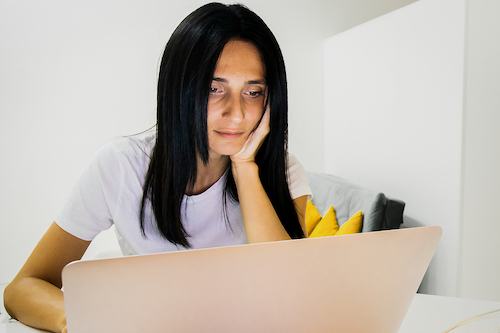 Feeling stressed? Try watching a short inspirational video.
Feeling stressed? Try watching a short inspirational video.
Research published by the American Psychological Association has found that watching short videos that were inspiring may be as effective as meditation for reducing stress.
“We found that watching short inspirational videos every day for 5 days made people feel more hopeful, and those hopeful feelings contributed to reduced stress up to 10 days later. Importantly, we found a very similar effect of those who meditated for the same amount of time,” Robin Nabi, PhD, lead author of the study and a Professor of Communication at the University of California Santa Barbara told Theravive.
“The possible emotional benefits of using media tend to get little attention. But we know that positive emotions, especially hope, contribute to well-being, and that media content can be quite powerful in evoking positive emotions. So this research not only demonstrates potential positive outcomes of consuming certain types of media, but it also helps people see that the media choices they make have implications for their psychological well-being.”
In undertaking her research, Nabi and colleagues enlisted more than 1000 adults based in the US. Between the Thanksgiving and Christmas period, the participants completed a questionnaire to determine their initial stress levels.
In the following week, the participants were assigned to one of five groups. Some of these were told to view an inspirational video, some were asked to watch a comedy segment, some were asked to follow a guided mediation and some were asked to scroll on their phone. One group was also given no specific instruction related to media consumption.
Following their assigned exercise, participants answered questions focused on how they felt emotionally in that moment. The participants were then followed up each week for two weeks to see how their activity influenced their stress levels.
The researchers found that people who watched the inspirational videos or followed the guided meditation as their assigned activity felt more hopeful compared with the control group who were not given specific instructions for an activity. That feeling of hope then predicted a lower stress level a few days later, as well as up to 10 days later.
Nabin says the findings highlight the importance of hope as a stress reducing tool.
“Hope is a wonderful coping tool. When we feel hope, not only do we feel good emotionally, but we also feel better able to handle the challenges in our lives. Combined, these two benefits of hope help to reduce our stress,” she said.
“In our research, we found a wide range of people benefited from this intervention. There was some benefit, regardless of levels of baseline stress, self-esteem, and resilience. We also found adults across the lifespan – from 18-86 – demonstrated benefit as did men and women. The key, however, is that the media content evoked feelings of hope.”
Amid rising awareness of some of the harms of too much screen time and media consumption, the research suggests that some media use can be helpful.
“Certainly the lion’s share of attention when it comes to social media is on the negative effects, and perhaps for good reason. It’s important that we protect ourselves and our kids from potential harms that might come from engaging in digital spaces. But when we only focus on the harms, we lose sight of the fact that there are ways that we can be uplifted with digital content. We would certainly never suggest that endless scrolling of short form media content is a good idea. But our research, both the current study and past ones, demonstrate that small doses of inspiration content can be beneficial,” Nabi said.
“We can’t control the media ecosystem, but we can actively make choices within that ecosystem to select media content to support our well-being. With this in mind, starting a habit of choosing content that makes us feel hopeful is a promising strategy to reduce stress.”
